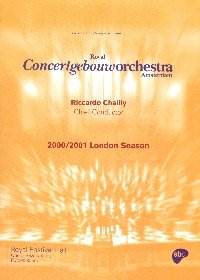
Heard in a performance as persuasive as Riccardo Chailly's there is no doubt that Deryck Cooke's Performing Version of Mahler's 10th is a masterpiece. Heard in a performance as sublimely played as this one was, by a truly world class orchestra, and the effect is as turbulent as it is impassioned.
If Rattle brings to this work an outsized schizophrenia, Chailly brings to it an unerring balance. Chailly is less concerned with the histrionics of this work and more concerned with the strength and beauty of the scoring. Chailly makes more sense of the echt Mahlerian counterpoint and harmony than almost any other conductor, and does so with a concern for dynamics that takes silence to the limits of musical possibility. Both the first and final movements contained pianissimos that only the greatest orchestras can muster.
The dark opening theme of the adagio, with violas supremely violet-toned, had a Brucknerian glow to it that set the seal on a performance that was heavily string balanced. The Dutch strings themselves were never better than in the Fifth movement's great string melody. Marked Immer Adagio in the score (bar 351), this restatement of the flute's opening theme is one of the most radiant in all Mahler and Chailly wrought from combined strings impassioned playing. Cellos breathed, violas sighed and basses were blackened beside them. Violins achieved a noble purity of tone at the sempre ff marking, and the horns' entry at bar 361 was magically done. It is a crucial moment in this work and one that I have not heard better done elsewhere.
Paul Verhey's flute solo was pure poetry - serene, arching, aching in its beauty, Frits Damrow's trumpet piercing like a needle before the movement's dissonant chord is repeated.
The three central movements had a symmetry to them that was evolutionary. Rattle's Berlin performance was notorious for a Purgatorio that almost fell apart, but here the Concertgebouw were on their collective toes. The first scherzo, with its constantly changing time signatures, was a triumph in a movement which is often problematical; the second scherzo, a buoyant, lamenting waltz was more energetic and devilish than many have seen in this movement.
Mahler's Tenth is perhaps the most difficult of his scores to play - partly because there is no performance history. Technically it is fiendish, and the Concertgebouw (the unrivalled Mahler orchestra par excellence) were as fallible as any other orchestra in this work. The trombone entry in the first movement was botched and there were some moments of insecurity and co-ordination among the trumpets in the final movement (single to multiple trumpets were never as seamless as they should have been). Having said that, this performance was extraordinary for the passion of its playing. A great performance? I think so.
In the first half, Matthias Goerne was the soloist in the Rückertlieder. These oddly balanced songs, with three short ones followed by two much longer ones, were stunningly sung. Having heard Mahler songs sung this year by Russian baritones it was refreshing to hear perfectly idiomatic phrasing and a concern for the words that displayed a total understanding of Mahler's writing. Goerne was nowhere finer than in the dark, sublime fourth song. The beauty of tone was resplendent, the care he took over shading his voice intensely moving. Only occasionally, and notably in the final song with its sense of blazing resurrection, was he overwhelmed by the orchestra which played with extraordinary refinement throughout.
Inexplicably, there were rows upon rows of empty seats for this concert. Is it finally the case that we are hearing too much Mahler in the concert hall, or was the programme too revolutionary for many? Answers on a postcard please.
Marc Bridle
This concert will be broadcast by Radio 3 on 11 October at 7.30pm. Riccardo Chailly's Berlin Radio Symphony Orchestra recording of Mahler's Tenth has just been reissued by Decca [466 955-2 DH].
 Return to:
Return to: